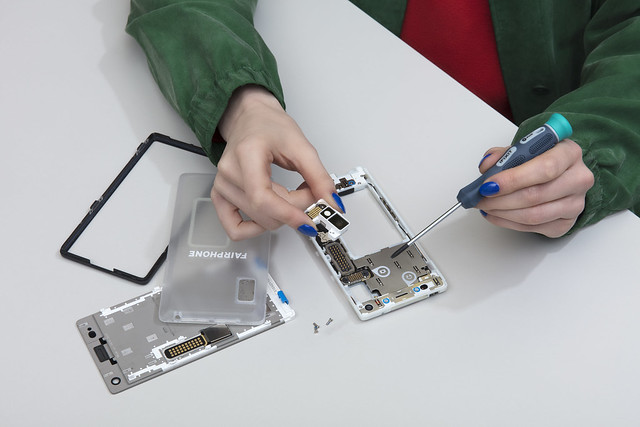Exploitative working conditions – where workers are overburdened and underpaid – are not uncommon, especially in the field of electronics manufacturing. Many of the workers who make our favourite digital gadgets are exposed to health risks on the job, work long days, and don’t receive fair wages or full social benefits. Many consumers are unaware of these unethical working conditions. Nor are they aware that our increased consumption of electronics is draining many of the planet’s natural resources, while the global mountain of electronic waste continues to grow.
Governments and lawmakers still haven’t done enough to hold manufacturers accountable. And when it comes to buying smart devices, there is little information available to consumers who want to take social and ecological criteria into account.
What can you do to support the development of sustainable electronics?
Question your own consumption
It’s a scenario that’s familiar to many of us. We own a smartphone or laptop for only a few months or years. Then it’s time for a new device with more functions, better performance and a more appealing design. Our old device is discarded, possibly without much thought. But do we really need to have the latest smartphone when the “old” one still works perfectly?
It’s always best to only buy new electronic devices when you absolutely have to. And when the time does come when you have to invest in something new, consider all of the different options available to you – not only when it comes to design and memory, but also durability and sustainability of production. You can even choose to buy second-hand – saving not only resources, but also probably a whole lot of money in the process.
- Back Market is an online marketplace where you can find all kinds of refurbished electronics, including smartphones, laptops and tablets. Back Market guarantees all of its items are “100 percent functional,” and operate throughout Europe.
- Another option for refurbished electronics is reBuy. Originally started in Germany, you can now buy and sell used devices on the site throughout the UK, Spain and Italy too. All products are fully refurbished and come with warranties, and are available to buy in various different conditions – from brand new to very good and good.
Look for alternatives
One key step to more conscious consumption is the search for alternatives – and while sustainable, ethically-made electronics are still a niche market, the options are increasing.
The following are already on the market:
- Shiftphone: Everyone involved in producing the Fairphone receives fair wages and works under fair and ethical conditions. The phones are free from conflict materials such as coltan and are manufactured in an environmentally responsible way. Made in Germany, Shiftphones are also guaranteed to be durable thanks to its modular design, meaning that individual parts can easily be swapped out and replaced.
- Fairphone: Hailing from the Nethlerands, Fairphone’s smartphones are manufactured under the fairest possible conditions, and the product’s consumer-friendly eco-design is also both modular and repairable. Fairphone also places an emphasis on ensuring fair working conditions and environmentally friendly production methods.
- Nager IT: NagerIT is dedicated to producing socially and environmentally sustainable computer mice. Their product is manufactured in Germany and the entire supply chain (shown below) is made available on their website.
 © Nager IT
© Nager IT Check manufacturers’ green credentials
Unfortunately, there are only a few manufacturers that offer completely fair and green consumer electronics. However, the following guides will help you find out which manufacturers do at least try to take some sustainability considerations into account.
Greenpeace is active in this area and produces a semi-regular Guide to Greener Electronics. The guide evaluates the leading electronics brands in terms of their commitment and progress with regard to three environmental criteria: energy and climate, environmentally friendly products and sustainable business.
The Berlin-based company Earth Ratings has developed a free browser plug-in for Chrome and Firefox to help online shoppers make sustainable purchasing decisions by giving them detailed information about how the things they spend money on affect the planet and its inhabitants.
The Berlin-based non-governmental organization WEED – World Economy, Ecology and Development e.V. has been campaigning for labour rights and environmental justice in the electronics industry for many years. One project that WEED is working on together with six other NGOs is called Electronics Watch – an independent organisation that monitors working conditions in the global electronics industry. Electronics Watch supports large-volume consumers of ICT who want to make sure the products they are buying have been made with sustainability criteria taken into account.
 © Greenpeace Greenpeace hat 17 Technologieunternehmen befragt und auf ihre Umweltverträglichkeit untersucht
© Greenpeace Greenpeace hat 17 Technologieunternehmen befragt und auf ihre Umweltverträglichkeit untersuchtMore tips for a sustainable digital lifestyle
- In our background article Our Digital Carbon Footprint – What’s the Environmental Impact of the Digital World? we offer you insights into what your “digital footprint” actually is, what types of websites and online activities have the biggest environmental impact and what you can do to make your online life greener and fairer too
- Want some more simple tips on how to reduce the environmental impact of your online life? Check out our article and our 8 ways to shrink your digital carbon footprint.
- Did you know that your saved emails are constantly consuming electricity? Why not clean your inbox and help save the planet?






